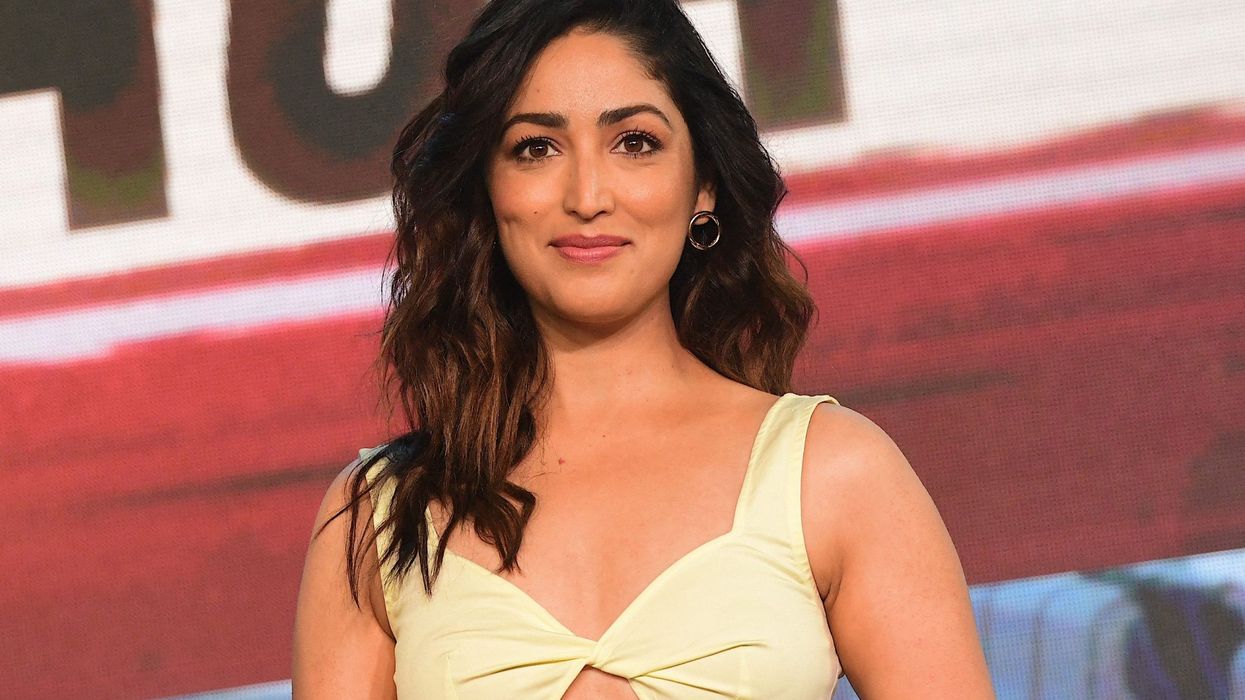WITH her most recent films Chor Nikal Ke Bhaga, Lost, Bhoot Police, A Thurs - day, Dasvi and Ginny Weds Sunny having streaming site premieres, Yami Gautam returned to cinema screens with the new release OMG 2 after a gap of four years.
The satirical comedy-drama sequel sees her star opposite Akshay Kumar and Pankaj Tripathi. She plays a no-nonsense lawyer in the story that combines a legal battle, morality, sex education and di - vine intervention. Eastern Eye caught up with the actress to discuss the film, her journey from television, being self-made and the art of choosing good projects.
You play a lawyer in OMG 2. What kind of preparation did you do for the role?
My preparation in - volved a lot of reading. I like to be very thorough with my script to the point where I am tired, but every time I read it, I feel that there is something different I felt this time. For this part, I worked on my diction, my enunciation and in what different way you say a line as a lawyer. You are not just delivering lines. Your audience should feel that emotion and diction. You play a lawyer in the film, who goes up against the everyday man played by Pankaj Tripathi. How was that? Well, he is very entertaining. He is very funny and that was just because the char - acter has to be. It is Pankaj Tripathi, he has his own style of comedy. There is no exaggeration but only situational comedy.
Did you have any apprehensions be - fore signing a film that talks about sex education?
As an actress, I have never shied away from taking up such roles. I spoke with Akshay Kumar also that it’s very important that the kind of audience this film is catering to should not feel embarrassed or shy away at any point. I feel very happy that I decided to go ahead with this film. When I read a script and if I like it, I don’t over analyse, I just go for it. I just go with my first instinct. So far, it has been in sync with the audience. So, I hope even this one does too.
You started on television before venturing into films. What was that experience like?
My first TV serial (Chand Ke Paar Chalo) didn’t do well. It ran for just three or six months. But, a lot of people told me, ‘You were very good in it’. I have very faint memories of television. I just re - member working at a stretch for hours and hours, without going home. I didn’t know what to do or cry without glycerine. You need to cry a lot on TV.
Is that why you decided against working for TV?
I took a sabbatical. I said, ‘I want to try auditioning to see the world now which is beyond this, because I am not enjoying what I am doing creatively’. Of course, television comes with its own financial security but that’s not my priori - ty. I wanted to do something else. Films are, of course, altogether different.
Was transitioning to films easy?
You feel, ‘oh, what’s so difficult?’ If you are a good actor, that’s it. First film hit, what more can go wrong? Fantastic! But that’s not how it is and we all know that. It takes a lot to be here and come to a point where you can give voice to your choices.
Do you feel proud of the fact that you are a self-made actor?
There is nothing called a self-made ac - tor. Even though I am from another city with no background, there are always people behind you and rooting for you. Be it your family, certain fans, that one producer, or a director who is willing to take that punt on you, saying, ‘I want to cast her and let’s see what happens’.
You have always chosen characters that are different from one another. Are all these choices intentional?
They are very much intentional. It is not possible that you’re making these choices and not be aware of what you are doing. In fact, a lot of work and thought goes into it. Maybe that thought was always there, even when there weren’t many opportunities. I am very proud of that phase also. Now where I have the choice to make those choices, I pick good films. OMG2 is definitely a part of it.
The uniqueness started with your debut Bollywood film?
I started my career with a film like Vicky Donor. If I tell you, a lot of people had said, ‘what a time is this, that a film on such a (taboo) subject is being made’. But it turned out to be a family enter - tainer and a cult film because of the path-breaking writing.
How do you make sure that you don’t repeat yourself?
It come from nuances. It comes from depth, your speech, how good your Hin - di is or whatever language you are speaking, for that matter. Even if you are not talking, sometimes silences are more powerful than words. So, all that comes from, I think, your director and the actor’s understanding.
Your films have performed well on multiple platforms, but is the joy of a theatrical hit more powerful than a streaming platform success?
This just reminds me that OMG 2 is my first theatrical release after Bala in 2019. 2019 gave me Bala, URI: The Surgical Strike and my husband (director Aditya Dhar). Absolutely, the joy of a theatrical release is unparalleled. It’s something else. Films were meant for the big screens and made to be enjoyed in a dark hall, where you are sitting next to strangers, your family or friends. You are just transported to this whole new world. Times change. We never saw it (Covid-19) coming and completely changing the viewer watch - ing experience.
Did this in - form your choices?
As an actor, when I sign a film, I don’t think even one bit that okay, this is for OTT and for theatrical. If it’s like that, then I don’t do that film. A film has to be good and should be. It’s a producer’s prerogative, a hard call that what should we do next. Unless it’s already a pre-sold with





